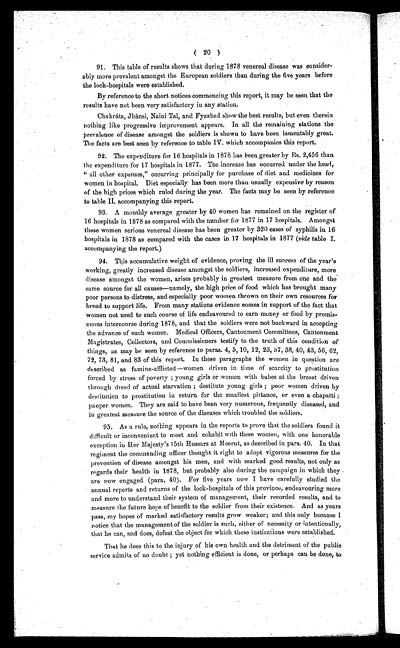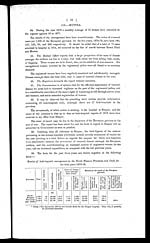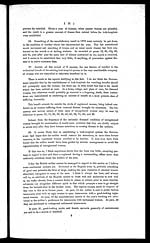Medicine - Institutions > Lock hospitals > Annual report on the working of the lock hospitals in the North-Western Provinces and Oudh > Fifth annual report of the working of the lock-hospitals in the North-Western Provinces and Oudh for the year 1878
(172) Page 20
Download files
Individual page:
Thumbnail gallery: Grid view | List view

( 20 )
91. This table of results shows that during 1878 venereal disease was consider-
ably more prevalent amongst the European soldiers than during the five years before
the lock-hospitals were established.
By reference to the short notices commencing this report, it may be seen that the
results have not been very satisfactory in any station.
Chakráta, Jhánsi, Naini Tal, and Fyzabad show the best results, but even therein
nothing like progressive improvement appears. In all the remaining stations the
prevalence of disease amongst the soldiers is shown to have been lamentably great.
The facts are best seen by reference to table IV. which accompanies this report.
92. The expenditure for 16 hospitals in 1878 has been greater by Rs. 2,456 than
the expenditure for 17 hospitals in 1877. The increase has occurred under the head,
" all other expenses," occurring principally for purchase of diet and medicines for
women in hospital. Diet especially has been more than usually expensive by reason
of the high prices which ruled during the year. The facts may be seen by reference
to table II. accompanying this report.
93. A monthly average greater by 40 women has remained on the register of
16 hospitals in 1878 as compared with the number for 1877 in 17 hospitals. Amongst
these women serious venereal disease has been greater by 320 cases of syphilis in 16
hospitals in 1878 as compared with the cases in 17 hospitals in 1877 (vide table I.
accompanying the report.)
94. This accumulative weight of evidence, proving the ill success of the year's
working, greatly increased disease amongst the soldiers, increased expenditure, more
disease amongst the women, arises probably in greatest measure from one and the
same source for all causes—namely, the high price of food which has brought many
poor persons to distress, and especially poor women thrown on their own resources for
bread to support life. From many stations evidence comes in support of the fact that
women not used to such course of life endeavoured to earn money or food by promis-
cuous intercourse during 1878, and that the soldiers were not backward in accepting
the advance of such women. Medical Officers, Cantonment Committees, Cantonment
Magistrates, Collectors, and Commissioners testify to the truth of this condition of
things, as may be seen by reference to paras. 4, 5, 10, 12, 23, 37, 38, 40, 43, 56, 62,
72, 73, 81, and 83 of this report. In these paragraphs the women in question are
described as famine-afflicted—women driven in time of scarcity to prostitution
forced by stress of poverty ; young girls or women with babes at the breast driven
through dread of actual starvation ; destitute young girls ; poor women driven by
destitution to prostitution in return for the smallest pittance, or even a chapatti ;
pauper women. They are said to have been very numerous, frequently diseased, and
in greatest measure the source of the diseases which troubled the soldiers.
95. As a rule, nothing appears in the reports to prove that the soldiers found it
difficult or inconvenient to meet and cohabit with these women, with one honorable
exception in Her Majesty's 15th Hussars at Meerut, as described in para. 40. In that
regiment the commanding officer thought it right to adopt vigorous measures for the
prevention of disease amongst his men, and with marked good results, not only as
regards their health in 1878, but probably also during the campaign in which they
are now engaged (para. 40). For five years now I have carefully studied the
annual reports and returns of the lock-hospitals of this province, endeavouring more
and more to understand their system of management, their recorded results, and to
measure the future hope of benefit to the soldier from their existence. And as years
pass, my hopes of marked satisfactory results grow weaker; and this only because I
notice that the management of the soldier is such, either of necessity or intentionally,
that he can, and does, defeat the object for which these institutions were established.
That he does this to the injury of his own health and the detriment of the public
service admits of no doubt ; yet nothing efficient is done, or perhaps can be done, to
Set display mode to: Large image | Zoom image | Transcription
Images and transcriptions on this page, including medium image downloads, may be used under the Creative Commons Attribution 4.0 International Licence unless otherwise stated. ![]()
| Permanent URL | https://digital.nls.uk/75111348 |
|---|




